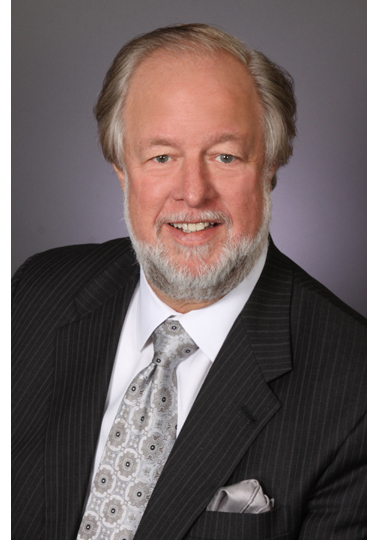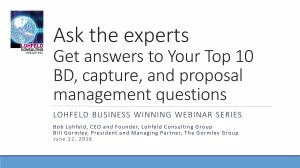Q&A Part 4: Capture and proposal processes
Watch the webinar replay and listen to the podcast (MP3)
 Recently, Bob Lohfeld, CEO, Lohfeld Consulting Group and Bill Gormley, President and Managing Partner, The Gormley Group discussed various challenges faced by BD, capture, and proposal professionals supporting Federal Government contractors.
Recently, Bob Lohfeld, CEO, Lohfeld Consulting Group and Bill Gormley, President and Managing Partner, The Gormley Group discussed various challenges faced by BD, capture, and proposal professionals supporting Federal Government contractors.
Read the Q&A, watch the webcast, or listen to the podcast to find out how to help your company work smarter and reinvent what you’re doing to remain competitive in today’s GovCon market.
Question: What are your suggestions for transitioning a company “set in their old ways of doing business” to a smarter and more competitive process?
Bob: This is a great question because we see a lot of these processes that have atrophied within companies that were “good enough” in the good days. But as the market contracts, the competitive standards are increasing, and if companies aren’t adapting their processes to the new competitive market, they’re falling behind and will lose business. The market is indeed more competitive and we’re stressing with companies they need to have a defined, repeatable capture process in place that they manage to and measure their progress along the way, and that becomes a great predictor of success down the road. Then we need to change this mentality in companies that what they have to do to win is write a proposal. What they have to do to win is write a very “high-scoring” proposal. That’s a whole different game from just writing a proposal.
Bill: They have to be more focused in the market.
Bob: Sure they do.
Bill: So if your win rate goes down, what does that mean? You’ve got one or two things.
Bob: First it means you probably picked poorly the deals that you want to bid. That’s the number one challenge when win rate drops or capture rate drops. Second is that you’re writing proposals, you’re pushing out a lot, and none of them is very competitive.
Bill: So if your win rate drops, is that more on the BD side or on the prep side of the proposal from your viewpoint?
Bob: Well this is where it’s hard. It’s on the executive side in my view. Your company leadership never saw an RFP they didn’t want to chase, and as long as they’re not working nights and weekends and you are, they’ll keep the process going. That’s where you’ve got to push back and say, “We only have so much human effort we can put in this. So we need to pick well. And if we pick well, we’ll have a winning season.” It’s not like baseball where you have to play every game in the calendar. With proposals you pick the ones you want to play. You don’t have to play every game.
Question: Under what circumstances, if any, should a company respond to an RFP when it’s had limited to no impact on the creation of the RFP?
Bill: You know you can get into a fire drill here. You can run around, but—to use some of Bob’s knowledge he shared today—you need to be strategic. You need to be smart about it and not chase everything. That’s a danger there. But, I think if you haven’t had any involvement, if it’s a pretty straightforward opportunity and you’re not really having to stress internally to go after it—maybe you’ve already provided similar solutions—I think it makes it an easier choice to go for it.
Bob: I would agree. Having an impact on the RFP is only one of 10 criteria that we look at. The others that are more important are how deeply do you understand the requirements and the needs of the agency, and how well does your solution match up. Those will trump whether or not you had an impact on the RFP.
Bill: So with zero capture, how does that affect commission on a salesperson?
Bob: Zero capture—this is really neat. If you explain to them that you want to bid this and you haven’t done any capture but the top five competitors have been working this for a year and here’s what they’ve done. Now do you want to jump in the race? Can you beat them in the last 30 days? I don’t know. Maybe. I wouldn’t bet my money on it generally, but that’s what you’re up against.
Question: Can you share a streamlined bid/no-bid process that is effective for a 10-person BD team supporting a 200-person group?
Bill: I know this is your sweet spot, Bob, but can I say something?
Bob: Sure!
Bill: I think you really need to maximize shared services models. There’s a lot out there. So I think to not overstress the company from a resource standpoint, all companies use outside resources and it makes them more targeted in better leveraging resources internally. It may give you a greater opportunity for capture. That’s my layman’s experience on this, but you’re the pro here.
Bob: We have a model that we use, and we recommend companies adapt their practice using our model as a starting point. You have unique capabilities in your company—your own specialized market—and you can improve the model. Our model is not a quantitative model. We don’t believe that you get five points for this and two for that, and you add them all up and you have a score of 71 and you should bid. It is very much a model where the measures are qualitative. It’s how well do you really understand the customer requirements. How well does the customer know you and trust you—that you can perform? It’s these kinds of questions. We color score them red, yellow, blue, green and we use this color mosaic for making decisions. But a strong green or blue on understanding the customer’s requirements trumps everything else. So in the end, the executive needs to make an informed decision.
Question: How can you effectively incorporate lessons learned into your proposal development process?
Bill: I’d say 100% of the time get a debrief whether you win or “not win.”
Bob: I always argue that you either win or you gain experience—there’s no losing here—you’re gaining experience.
Bill: You don’t play; you don’t get an opportunity to win.
Bob: It’s an opportunity to learn.
Bill: Also document what in your debrief worked and why it didn’t.
Bob: Here’s the crazy thing. You get a debrief. The government explains to you where your strengths were and your weaknesses, and you share that with three of your closest friends, and that’s the end of it. When we talk with companies about lessons learned, I tell them that what we’re going to talk about are lessons “relearned” because you learned it before. It just didn’t stick. You need to have a process where it’s shared and the whole organization that competes for business understands what those challenges were and the problems and you come away with a game plan to say, “Let’s not relearn this lesson next time.”
Bill: I think a key takeaway on debriefs is do not get into an argument.
Bob: Yes. It’s not a time to threaten to protest. It’s a time to learn, and in all the debriefs I’ve participated in, I always tell them we’re not here to protest. We are here to learn, so please help us. We want to do better for you next time. Try to set that as a tone to the meeting.
Question: What are the value of “win-themes” in today’s market? My company executives are highly engaged in the “win-themes” process, but I have seen some data indicating that this might be a task in which we are over-engaged.
Bob: We did a study with people in government who evaluate proposals. We interviewed 40 of them under the ground rules that we wouldn’t disclose the procurements that were involved or in any way have comments come back to them. The first question we asked was, “What do you think of our win themes?” To a perfect score—100% said, “What’s a win theme?” So we came away from that with a different notion of what constitutes a great proposal, and we have to the best of our ability taken the term “win theme” out of our lexicon. What we talk about is “strengths” in the bid—features that can be scored as strengths—and we focus on those. Companies that are still dwelling and spending time on win themes, if they are other than strengths (which are conveyed as a feature, a benefit to the government that meets a narrow set of requirements, and a proof), then you’re spending lots of time on the wrong things.
Bill: Interesting. So in that regard, you want to use your strengths side. I guess a win theme is elaborating on how good you are? Is that it?
Bob: Yes. It’s a subtle story we’ve woven through our whole proposal to give you the feeling that we’re “thought leaders.”
Bill: So you feel good about yourself when they’ve written this down. I guess.
Bob: Yes. Most authors do.
Bill: So then you use “strengths.” I kind of view it as “blocking and tackling.” You have to address what the government’s looking for and that takes “strengths.”
Bob: This comes back to our concept of creating high-scoring proposals. You write a proposal to put points on the board, and companies lose sight of that. They write a proposal because in the RFP instructions, it says “write this.” So we wrote it, and we wrote it really well. But, nowhere in there is any evidence that can put points on the scoreboard. So, we’ve long ago moved away from win themes, and we talk in terms of a compelling proposal that’s rich in features that could put points on the board.
Read Part 5 of the Q&A in the next blog post.
Watch the webinar replay and listen to the podcast (MP3)
Listen to the podcast on your PC (MP3):
Alternative content
Click to listen to the podcast on your tablet/phone (MP3)
During the webinar, Bob referenced a number of articles to assist government contractors:
- 7 questions to answer when making bid/no-bid decisions (improve your win rates)
- Win rates double with seven quality measures – updated (Lohfeld seven quality measures)
- DoD revamps source selection process
- DoD releases new Source Selection Procedures
Our experts:
 Bob Lohfeld, CEO and Founder, Lohfeld Consulting Group
Bob Lohfeld, CEO and Founder, Lohfeld Consulting Group
Bob Lohfeld serves as CEO and general manager of Lohfeld Consulting Group. He has more than 30 years’ experience winning contracts in the government market and is recognized consistently for leadership in business development, capture management, and winning proposals development. He teaches Capture Management, and he writes the Capture Management column in Washington Technology.
Prior to forming Lohfeld Consulting Group, Bob served as Division President at Lockheed Martin, Vice President of Lockheed Martin Information Technology, Senior Vice President at OAO Corp., Systems Engineering Manager at Computer Sciences Corp. (CSC), and Program Manager at Fairchild Industries. He also taught at the graduate level at George Washington University School of Engineering Administration.
Bob has served on the Board of Directors for the Association of Proposal Management Professionals (APMP) and Association of Proposal Management Professional National Capital Area Chapter (APMP-NCA), as Chairman of the American Council on Technology Industry Advisory Council (ACT/IAC), Vice Chairman of the Technology Council of Maryland (TCM), and Board Member of the Armed Forces Communications and Electronics Association (AFCEA), Government Electronics and Information Association (GEIA), and Juvenile Diabetes Research Foundation (JDRF Capital Region). He is a three-time winner of Federal Computer Week’s Federal 100.
Bill Gormley, President and Managing Partner, The Gormley Group
 Bill Gormley is a 40-year veteran of government procurement. He spent 28 years at the GSA in positions ranging from procurement agent to Senior Executive (SES) Assistant Commissioner for the Office of Acquisition. He was responsible for acquisition policy and all contracting operations, which included the Federal Supply Schedules Program. Bill’s extensive experience re-engineering the GSA Multiple Award Schedules Program earned him recognition by both government and industry. While serving as Assistant Commissioner for the Office of Acquisition at GSA, Bill received both the Presidential Rank Award for Meritorious Executives and the Vice President’s “Hammer Award” for changes to the Federal Supply Schedules Program. He was twice named to the Federal Computer Week Federal 100 awards—a prestigious group nominated by their peers for outstanding contributions to industry and government.
Bill Gormley is a 40-year veteran of government procurement. He spent 28 years at the GSA in positions ranging from procurement agent to Senior Executive (SES) Assistant Commissioner for the Office of Acquisition. He was responsible for acquisition policy and all contracting operations, which included the Federal Supply Schedules Program. Bill’s extensive experience re-engineering the GSA Multiple Award Schedules Program earned him recognition by both government and industry. While serving as Assistant Commissioner for the Office of Acquisition at GSA, Bill received both the Presidential Rank Award for Meritorious Executives and the Vice President’s “Hammer Award” for changes to the Federal Supply Schedules Program. He was twice named to the Federal Computer Week Federal 100 awards—a prestigious group nominated by their peers for outstanding contributions to industry and government.
Bill left GSA to become President of the Washington Management Group (WMG). Shortly after joining WMG he purchased FedSources, a leading market intelligence firm for federal spending, and spent the next 11 years running both companies as President and CEO until both were acquired in 2011 by Deltek, Inc.
In addition to Bill’s role as President and Managing Partner of The Gormley Group, Bill serves as Chairman of The Coalition for Government Procurement and Vice Chair of the Procurement Roundtable. He is a lifetime member of the National Institute for Government Purchasing (NIGP). Bill has contributed to the publication of two books related to the GSA Schedules Program and is recognized for his GSA Schedules domain expertise.
Paperback or Kindle
10 steps to creating high-scoring proposals
by Bob Lohfeld
contributors Edited by Beth Wingate
Subscribe to our free ebrief
Teaming friends, frenemies, and enemies—12 tips to mitigate harmful effects
Did you know that contracting officers spend up to 20% of their time mitigating disputes between teaming partners? In an informal poll we conducted on LinkedIn last month, 40% of respondents classified their teaming partners as “frenemies” on their last bid.
Explore Further
- Advice (446)
- AI (5)
- APMP (17)
- Business Development (198)
- Capture Management (197)
- Favorite Books (5)
- Go-to-Market (27)
- Graphics (6)
- Lohfeld Books (3)
- Past Performance (58)
- Post-submission Phase (15)
- Pre-RFP Preparation (211)
- Proposal Management (270)
- Proposal Production (60)
- Proposal Reviews (27)
- Proposal Writing (77)
- Pursuit Phase (89)
- Research Report (2)
- Resources (60)
- Tools & Tips (259)
- Training (10)
- Uncategorized (220)

Sign Up for INSIGHTS and Download your FREE book
We'd love to help you with your proposals. Enjoy our complimentary Lohfeld Consulting Group Capture & Proposal Insights & Tips book with your FREE subscription to our Insights Newsletter.
GET YOUR FREE BOOK





